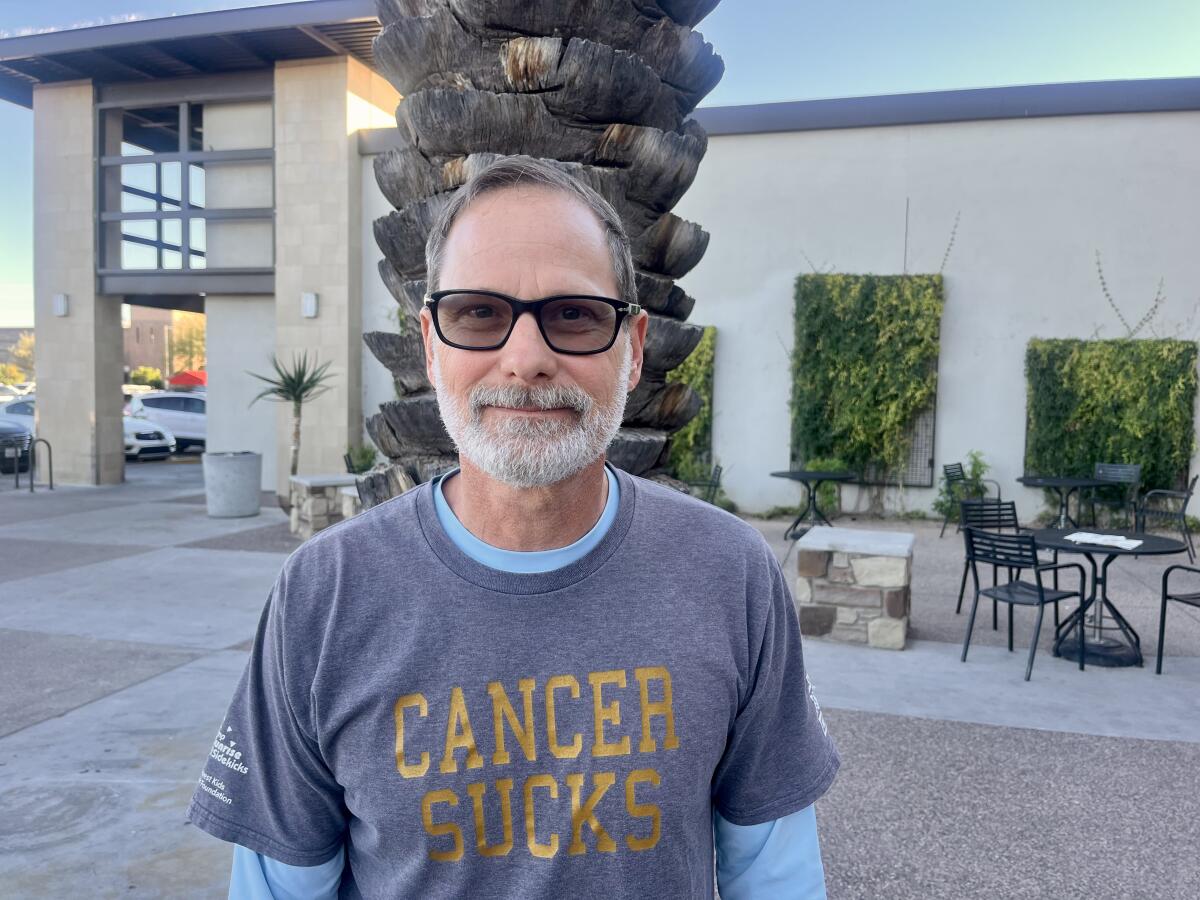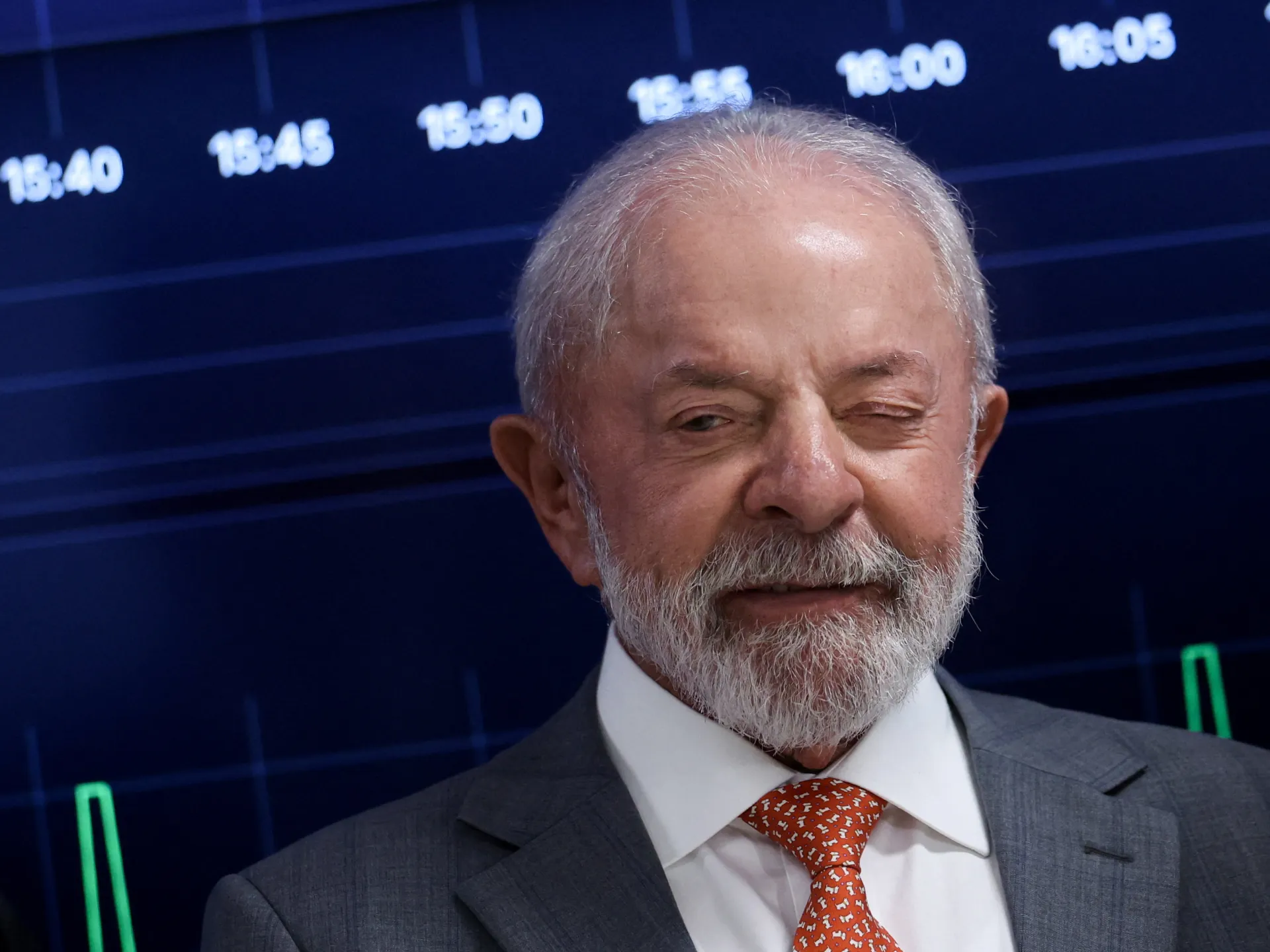Voters in congressional battleground discuss midterm vote
CAREFREE, Ariz. — Elizabeth H. paused recently outside the post office in this small, high-desert community, not far from where Easy Street meets Nonchalant Avenue.
She felt neither easy nor nonchalant.
“I think the climate imposed by the Trump administration is really sad and scary,” said Elizabeth, who asked to withhold her last name to avoid being attacked for the views she expressed.
“I don’t like the way that ICE is being used to bully citizens and even just people who are brown,” she continued. “And I don’t like that governors of blue states are being shut out while governors of red states are being welcomed. I just don’t think he treats us like we’re all Americans.”
For his part, Anthony D. finds little not to like about President Trump. He, too, asked not to use his last name, as did several others who agreed to talk politics.
“We finally don’t have a— in office that are destroying our country and worrying about everybody else in the world,” said Anthony, 66, a plumbing contractor and proudly blunt-spoken New York native. (Just like Trump, he pointed out.) “I mean, his tariffs are working. The negotiations are working. I just see a lot of positive coming out of that office.”
Even so, there’s something that bothers him: The way so many fellow citizens view the president and his America First agenda.
“Most people don’t like what he says, but look what he’s doing,” Anthony said as the late-morning crowd trickled into an upscale North Scottsdale shopping center. “You can hate the person, but don’t hate the message. He’s trying to do the right thing.”
Here in central Arizona, a prime battleground in November’s midterm election, there is precious little agreement about Trump, his policies and motivations.
Supporters see the president turning things around after four disastrous years of Joe Biden. Critics see him turning the country into a place they barely recognize.
There is puzzlement on both sides.
Over what others believe. Over how others can possibly believe what they believe, see the things they see and perceive Trump the way they perceive him.
And although some are eager for the midterm elections as a way to corral the president — “I don’t think they should only impeach, I think they should imprison,” Brent Bond, a 59-year-old Scottsdale artist, said of his hopes for a Democratic Congress — others fear an end to Trump’s nearly unfettered reign.
Or that nothing will change, regardless of what happens at the polls in November.
“The fact is, Trump is going to keep Trumping until he’s done,” said Elizabeth H., who’s semiretired at age 55 after a career in financial services. “My only relief is that he’s an old, old man and he’s not going to be here forever.”

Brent Bond would like to see Trump imprisoned, not just impeached.
(Mark Z. Barabak / Los Angeles Times)
Arizona’s 1st Congressional District climbs from northeastern Phoenix to the mountainous heart of the Sonoran Desert. It takes in the affluent enclaves of Scottsdale and Paradise Valley and — where the urban sprawl finally yields to cactus, palo verde and other flora — Carefree and the Old West-themed Cave Creek.
It is the whitest, wealthiest and best-educated of Arizona’s nine congressional districts, home to numerous upscale resorts, major medical campuses and a large population of retirees comfortably settled in one of many gated communities.
Affordability, as in struggling just to get by, is not a pressing issue here.
In 2020, Biden carried the district 50% to 49%. Four years later, Trump beat Kamala Harris 51% to 48%.
(The Down Ballot, which crunches election data, rated Arizona’s 1st District the median of 435 congressional districts nationwide, meaning in 2024 half were redder on the presidential level and half were bluer.)
For more than a decade, the area has been represented by Republican Dave Schweikert, a local political fixture since the 1990s.
He’s had to fight hard for reelection in recent years as the district, like the whole of Arizona, has grown more competitive. Rather than run again, Schweikert announced he would give up his seat to try for governor. The result is a free-for-all and one of the relatively few toss-up House races anywhere in the country.
A passel of candidates is running and the result will help determine whether Democrats, who need to flip three seats, will seize control of the House in November.
Despite those high stakes, however, the race doesn’t seem to have generated much voter interest, at least not yet. In dozens of interviews across the district, it was the relentless Trump who drew the most attention, admiration and exasperation.
Moe Modjeski, a supporter, allowed as how the president “is no altar boy.”
Even so, “I’ll take his policies over someone that might be nice and polite,” said the 69-year-old Scottsdale resident, a financial advisor who cited the sky-scraping stock market as one example of Trump’s success. “I mean, gas is about half the price it was a year or two ago.”
But for Liz R., who’s “never been a sky-is-falling type,” it certainly feels that way. The 75-year-old cited “everything from tariffs to ICE to destroying the healthcare system and controls for pollution.”
“I lived through the ‘60s and 70s and can’t remember a time when I feared so much for the future of our country,” said Liz, a retired medical technologist.
She’ll vote for a Democrat in November — to put a check on Trump, not because the Carefree resident has great faith in the party or its direction.
“I wish the Dems would get it together and maybe we could get more of a centrist that could unite and not get hung up on some of these social issues,” she said. “There’s a lot of economic issues, bread-and-butter issues, and I think that’s why the Republicans won [in 2024], because of the problems with immigration and inflation.”
As a border state, Arizona has long been at the forefront of the political fight over immigration. It was here lawmakers passed — and opponents spent years battling — legislation that effectively turned police into immigration officers, requiring them to demand the papers of anyone suspected of being in the country illegally

Thomas Campbell, with Keegan and Guinness, blamed blue-state politicians for any overreach by ICE agents.
(Mark Z. Barabak / Los Angeles Times)
Now that aggressive approach has become national policy, which is fine by Thomas Campbell, a retired architect and staunch Trump backer. He blamed any enforcement overreach on blue-state lawmakers.
“For some reason, the Democrats have decided they want to side with the criminals, so they don’t allow their police departments to cooperate,” said Campbell, 72, who stopped outside Paradise Valley’s town hall while running errands with his Irish setters, Guinness and Keegan. “If that wasn’t the case, there wouldn’t be any” controversy over ICE’s tactics.
Martha Cornelison agreed the border with Mexico needed to be secured and that serious lawbreakers should be deported.
But why, she wondered, are immigration agents scooping up honest taxpayers, parents with children born in the U.S. and others keeping on the straight and narrow?
“I think they’re going after the wrong people,” said the 76-year-old Scottsdale retiree as a friend, Lily, nodded in agreement. The two were sharing a bench in Scottsdale’s pueblo-inspired civic plaza, a nearby fountain burbling in the 80-degree sunshine.
“I think we need to look at our county jails, look at our city jails,” said Cornelison, who made her living selling large appliances. “How many illegal immigrants are, say, in Florence, which is our state prison? Send them back. Don’t go after Mr. Gonzalez who’s doing my lawn. Empty out our prisons.”
Back at the North Scottsdale shopping center, Denise F. was walking Chase, her Shih Tzu, past a parking lot brimming with Teslas, Mercedes and Cadillac SUVs.
The 73-year-old voted for Trump because she couldn’t abide Harris. But she’s disgusted with the president.
“I don’t like the division in the country. I think Trump thinks he’s a king,” said Denise, a retired banker. “He’s poking the bear with Venezuela and Greenland, Iran” — she poked the air as she named each country — “to see who he can engage in a possible war, which is not the way I think the United States should be.”
As Denise was finishing up, Anthony D., her friend and neighbor, strolled up and joined the conversation, offering his laudatory view of the president. “Trump’s a businessman and he’s running the country like a business,” Anthony said, as Denise looked on impassively.
“How did I do?” he asked after saying his piece.
“Great,” Denise replied amiably and the two walked off together, Chase between them.

